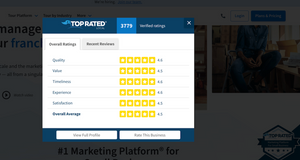A lot goes into building a solid online presence for your small business. You need a professional, mobile-friendly website, and you need to drive visibility in as many ways as possible, including digital advertising, SEO, social media marketing and beyond.
However, even if you have a great website and a visible online presence, your job isn’t quite done. You also need to be able to stand out from the competition, and one of the best ways to do that is with a strong reputation.
Here are a few things you can do to build a strong reputation for your small business.




